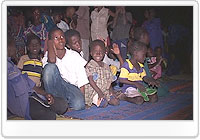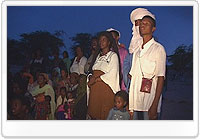At a glance: Niger
Mobile cinema brings entertainment and education to Niger’s desert dwellers
 |
| © UNICEF video |
| Children watch open air movies and UNICEF health messages at the remote desert oasis of Azzel, Niger. |
By Sabine Dolan
AZZEL, Niger, 30 December 2005–After a long drive through northern Niger’s arid landscape, a minivan pulls up in the remote desert oasis of Azzel. This evening, the van is bringing not supplies, but entertainment and education. The “cinema on wheels” has arrived.
After a round of traditional greetings from the Tuareg villagers and nomads who have turned out, Salamatou Alhassane, the coordinator for this mobile movie theatre, quickly gets down to business along with her staff.
Movies under the stars
Known as the “Cinéma Numérique Ambulant” (CNA – French for “Mobile Digital Cinema”), the open air cinema projects popular African films along with UNICEF health messages.
As her team lays down straw mats for tonight’s screening and plants posts in the soft sand for the large movie screen, Alhassane pauses to explain the project. “The objective of the CNA is to show to the most remote populations, populations that have no distractions, no radio, no television, to show them their own films: African films. The people here are really interested in our films, not only because they don’t have many distractions, but also the films we project and the themes debated are problems they experience,” she says, before quickly brushing sand from her flowing dress and returning to work.
 |
| © UNICEF video |
| Tuareg villager Rhissa Hama and his family watch the movie. |
With support from UNICEF and NGO’s, five mobile cinema projection vans travel to remote villages across Niger, Benin, Mali in western Africa, where they present popular African features, preceded by short UNICEF informational films containing vital messages about malaria prevention, child brides, HIV/AIDS prevention and water and sanitation.
Since its
debut in 2001, the CNA has brought movies and educational messages to
1.5 million people in Africa. It is as nomadic as the Tuareg people
who have gathered here this evening.
Mosquito nets as prizes
Having arrived by camel, on foot or packed into crowded pickup trucks, the Tuareg audience in Azzel sits waiting for darkness to fall. The movies will be shown under the stars.
Forty-five-year old Rhissa Hama, Azzel’s local craftsman, has come to tonight’s performance with his wife Nola and their seven children. “I’ve seen a few films in my life but this is different,” says Nola excitedly. “Tonight we’re going to learn about all these diseases which we don’t know about and learn how to avoid them.”
When the show begins, the children – eyes wide open with amazement – watch intently as human figures larger than anything they have ever seen before flit across the screen. Before the entertainment feature begins, two UNICEF videos are played: one about HIV/AIDS prevention, the other about early marriage. Both are shown in the two local languages: Tamachek and Haussa.
After the showing, Alhassane and her staff lead a lively health discussion, with prizes for 100 of the most active participants: insecticide-treated bednets to keep away malaria-carrying mosquitos.
Reaching nomads
Since 2000, UNICEF Niger has been active in Azzel, running an array of projects and programmes, including vaccination campaigns, cereal banks, community gardens, and the local school. Hassane Sanda Maiga, who is in charge of UNICEF Agadez’s head office, says the CNA is an effective way of sharing information with large numbers of people.
UNICEF uses projections during the six large desert festivals near northern Niger’s largest city, Agadez, that attract thousands of nomadic people every year. “We believe these gatherings are a great opportunity to reach these hard to reach populations who are constantly on the move” says Sanda Maiga. “We are in a very nomadic region and this is the only time they regroup so we’re really able to reach everyone.”
UNICEF is planning to produce a new film on safe nutritional practices to reach the people most affected by the ongoing nutrition crisis.
The CNA’s arrival in villages is always a festive event, where everyone, young and old, shows up. By bringing the world to these remote villages along with vital health messages, the CNA is hoping to participate in the fight against poverty.
Video
30 December
2005:
UNICEF correspondent Sabine Dolan travels to northern Niger with the
mobile cinema that is bringing entertainment and education to remote
villages.
Low
| High
bandwidth
(Real player)
Journalists:
Broadcast-quality
video on demand
from The Newsmarket
Related links
Niger: Food crisis may yet worsen
For pregnant women in Niger, prenatal check-ups come with grain
News
analysis: Niger crisis has deep roots
Links
- http://unicef.org/videoaudio/ramfiles/5498l_nigercinema.ram
- http://unicef.org/videoaudio/ramfiles/5498h_nigercinema.ram
- http://www.thenewsmarket.com/CustomLink/CustomLinks.aspx?GUID=94cfdf5a-3af5-41cf-837b-f88e77e6c638
- http://unicef.org/infobycountry/niger_30062.html
- http://unicef.org/infobycountry/niger_28290.html
- http://unicef.org/infobycountry/niger_28030.html
